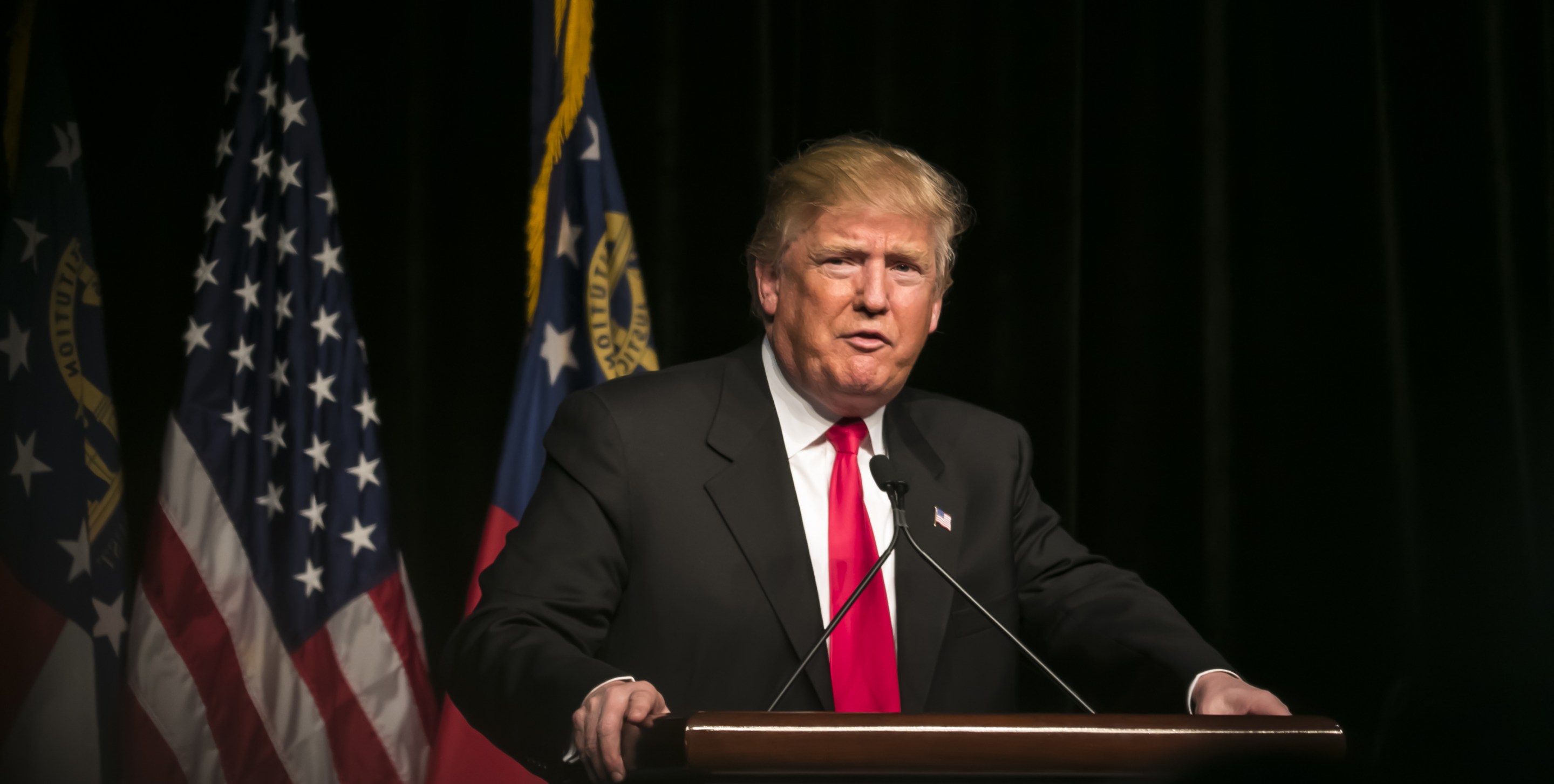The 25th Amendment has been speculated about several times during President Donald Trump's time in office, and after he tested positive for the coronavirus, the mechanism for removing a president from the White House has come up yet again.
Trump tested positive for coronavirus in late September, adding yet another layer to the 2020 election. After he left the hospital, House Speaker Nancy Pelosi (D-Calif.) announced a bill that would have Congress create a commission that would allow them to rule on a president's fitness in office.
The bill from Pelosi and Rep. Jamie Raskin (D-Md.) would create a Commission on Presidential Capacity made up of 16 people who are "former high ranking executive officers" and "medical authorities" to determine the fitness of the president. It is highly unlikely to become law.
Pelosi said the bill was not "about Trump" but he showed "the need for us to create a process for future president." However, Pelosi has said that Trump was "in an altered state" after he was discharged from the hospital following his coronavirus treatment.
But the Pelosi-Raskin bill is built upon the 25th Amendment. So what is the 25th Amendment in simple terms?
If you're wondering what the 25th Amendment really means for the presidency, here is a simplified guide to Trump and the 25th Amendment.
What is the 25th Amendment (in simple terms)?
In case the president ever resigns, dies, or is removed from office (by an act of Congress or by members of his own cabinet, which we'll get to later), the 25th Amendment of the U.S. Constitution lays out an order of succession.
Essentially, the 25th Amendment provides the rules for what to do if your democratically elected leader is all of the sudden M.I.A. The resignation of President Richard Nixon and the assassination of President John F. Kennedy, both of which occurred during the latter-half of the 20th century, are the most recent times the 25th Amendment has been invoked.
But there's also a last-ditch, emergency method for removing the president buried within the 25th Amendment. The extremely detailed fourth article, or section, of the 25th Amendment describes the process by which the vice president and the highest levels of government can intervene in case the president is ruled mentally or physically unfit for office.
In other words, if Vice President Mike Pence, along with a majority of Congress and/or Trump’s cabinet, believe that Trump is unfit for office, Article 4 of the 25th Amendment lays out the legal process for the president’s removal. Article 4 states in part:
Whenever the Vice President and a majority of either the principal officers of the executive departments or of such other body as Congress may by law provide, transmit to the President pro tempore of the Senate and the Speaker of the House of Representatives their written declaration that the President is unable to discharge the powers and duties of his office, the Vice President shall immediately assume the powers and duties of the office as Acting President.
Has the 25th Amendment ever been used to unseat a president?
Article 4 of the 25th Amendment has never been used, and perhaps for good reason: It also allows the president to easily fight back. Even if the vice president and the majority of the president’s cabinet and/or Congress decide that the president is unfit for office, Article 4 of the 25th Amendment gives the president a path to delay his removal and perhaps work out some deals.
So, if Pence and Congress tried to use the 25th Amendment against Trump, the president could respond with a written declaration that he is, in fact, fit for office. By doing that, he can immediately take back the office he just relinquished to Pence.
Pence would then have four days to submit a written declaration to Congress. Congress then would have a little under a month to vote on the issue in a special session.
Article 4 further states:
If the Congress, within twenty-one days after receipt of the latter written declaration, or, if Congress is not in session, within twenty-one days after Congress is required to assemble, determines by two-thirds vote of both Houses that the President is unable to discharge the powers and duties of his office, the Vice President shall continue to discharge the same as Acting President; otherwise, the President shall resume the powers and duties of his office.
READ MORE:
What constitutes being unfit to serve as president?
The language on what would make the commander-in-chief “mentally or physically unfit” is murky—and likely to incite controversy among mental health advocates. But Harvard Law Professor Lawrence Tribe believes the language could apply without a formal medical diagnosis. For instance, in the heat of the Russia investigation, it could have been possible that if Trump was found to have a major hand in Russia's intervention in the election and public support diminished to an all-time low, that could have been enough to invoke the amendment.
“In the unlikely event that Pence and a majority of Trump’s bizarre cabinet were to grow the spine needed to do the right thing with the process set up by that provision, we would surely be in a situation where a very large majority of the public, including a very substantial percentage of Trump’s supporters, would back if not insist upon such a move,” Tribe told the New York Times. “In that circumstance, I can’t imagine Trump and his lawyers succeeding in getting the federal courts to interfere.”
But Trump's mental health has long been a basis for bringing up the 25th Amendment.
The Hill reported that a few Democrats are openly questioning President Trump’s mental health. Rep. Earl Blumenauer (D-Was.) has asked for a full review of the 25th Amendment and how it could apply to mental illness. But such concerns over Trump's sanity have been laughed off by both Republicans in Congress and the millions of Americans who voted for Trump, not to mention mental health experts.
Fox News correspondent and psychiatrist Dr. Keith Ablow rejected such diagnoses of Trump's mental health, though he has never examined Trump personally, a key element of proper ethical diagnosis.
Ablow wrote in a Fox News op-ed:
Donald Trump is stone cold sane. When a man acquires billions of dollars through complex real estate transactions, invests in many countries, goes on to phenomenal success in television and turns his name into a worldwide brand, it is very unlikely that he is mentally unstable.When the same man obviously enjoys the love and respect of his children and his wife, who seem to rely on him for support and guidance, it is extraordinarily unlikely that he is mentally unstable. When the same man walks into the political arena and deftly defeats 16 Republican opponents and then the Democratic heir-apparent to a two-term president’s administration, the odds of that man being mentally unstable become vanishingly thin.
Ablow ignores the fact that psychiatrists don't see professional success as an indicator of mental health. Studies, in fact, have found mental illness among high-functioning professionals to be common.
Dr. Allen Frances, a psychiatry professor at Duke University Medical College and one of the authors of the DSM-IV—the book that literally defines mental illnesses—wrote in a New York Times op-ed that although Trump “may be a world-class narcissist ... he does not suffer from the distress and impairment required to diagnose mental disorder.”
Are there other reasons the 25th Amendment is an unlikely option?
As the days pass, national anxiety over uncertainty in the White House could rise. But even critics of the president may prefer Trump remain in office for the sake of national stability. During the Watergate hearings, former President Richard Nixon’s Gallup favorability ratings took a big hit. Even though 71 percent of Americans believed Nixon was culpable in wrongdoing, only 26 percent thought the president should be impeached or forced to resign, according to Gallup polls from 1974.
Beyond there being zero indication that they have the desire to use this constitutional power, the immense political fallout from invoking the 25th Amendment is what makes it such an unlikely option for Pence and Congress. Trump would have to do something truly egregious to draw the ire of his cabinet and Pence, who have all been on his side since his election.
“It would have to be very bizarre behavior by the president,” Northeastern University Professor Robert Gilbert told CBS News, referring to use of the 25th Amendment. “More bizarre than what we’ve seen.”
Editor's note: This article has been updated for relevance.







